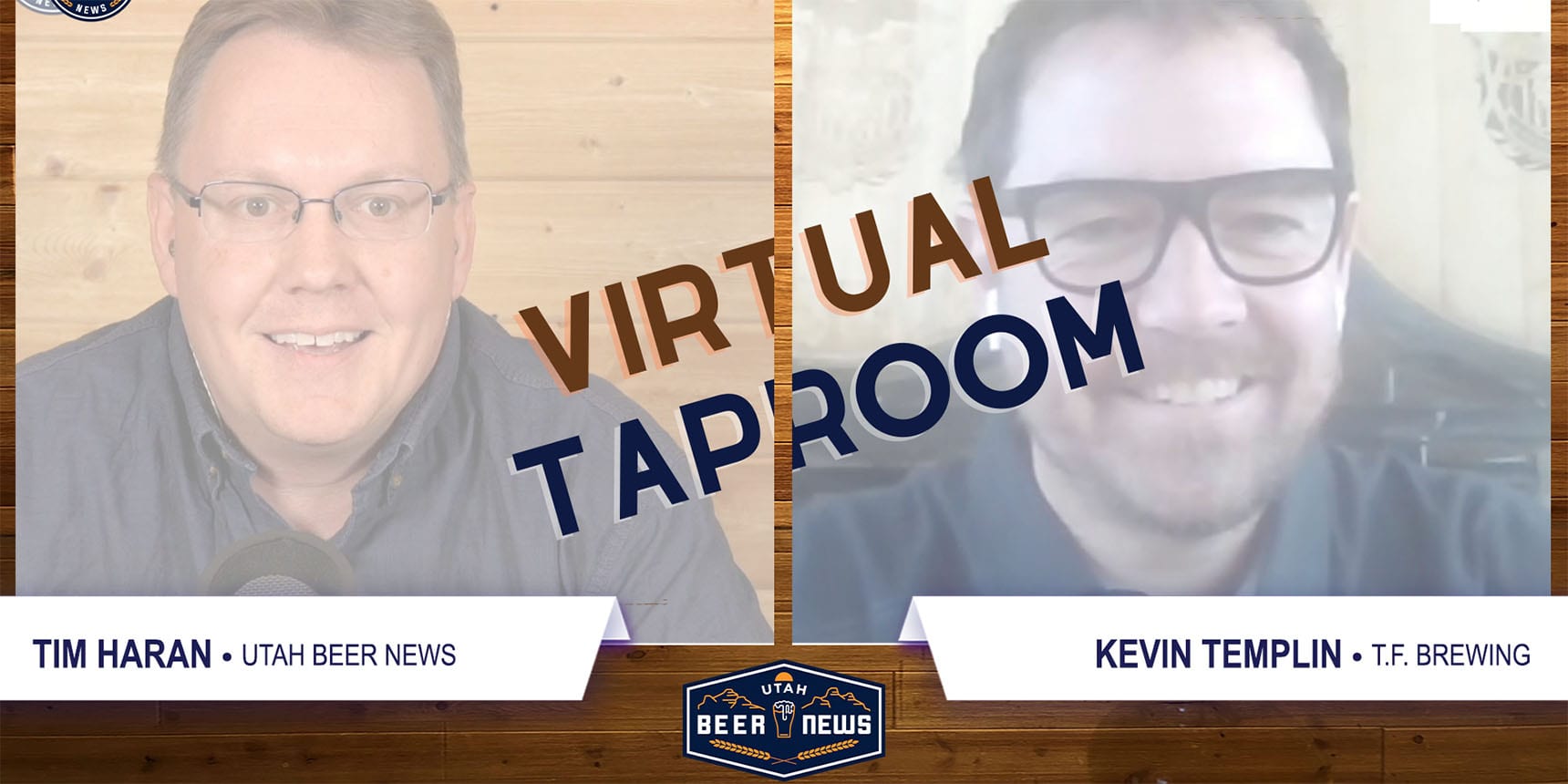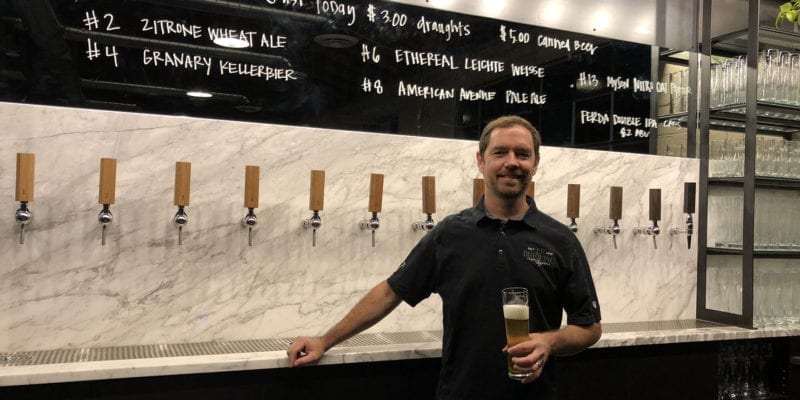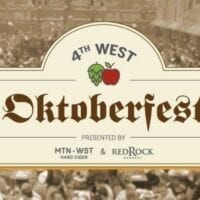
T.F. Brewing joins Utah Beer News for the latest episode of our Virtual Taproom video series.
Founder and Head Brewer Kevin Templin visits with Tim Haran to discuss a variety of topics, including:
- Kevin’s illustrious brewing career, which includes about 25 years in Utah
- The opening of T.F. Brewing in 2018 and the most rewarding aspect of owning a brewery
- German beers, specifically German-style lagers, as we celebrate German Beer Day on April 23
- And more!
About the Utah Beer News Virtual Taproom
Utah Beer News conducts 15-minute video interviews with brewers, breweries, and everyday imbibers. These brief conversations are recorded virtually. They are uploaded the same day (or the next day) to the Utah Beer News YouTube channel.
Instead of the more in-depth interviews and brewery histories typical of the Utah Beer News Podcast episodes and Brewery Profile articles, these bite-sized conversations feature so-called “newsy” information. We talk about new beer releases, upcoming events, and general happenings in and around Utah’s craft breweries.
If you’re a brewer or brewery representative — or even an everyday imbiber with a story to share — and would like to participate in an upcoming episode, please fill out the contact form.

T.F. Brewing Transcript
The following is a slightly edited transcript of our conversation. And here’s a previous article we wrote about Templin Family Brewing.
[Tim Haran]
Hello everyone. Thank you for joining Utah Beer News for the latest in our one-on-one conversations with local brewers, breweries, and everyday imbibers. I’m Tim Haran, founder of Utah Beer News. And my guest today is the one and only Kevin Templin, founder and head brewer at Templin Family Brewing in Salt Lake City.
Welcome, Kevin.
[Kevin Templin]
Timmy, I made it. I must have won the lottery. Here we go.
[Tim Haran]
You made it. This is the big time.
Thanks for taking the time to talk with Utah Beer News. Kevin’s been kind enough to join us today to talk not only about his beer and the brewery but also to discuss a little bit about German Beer Day and German beers in general since he’s somewhat of an expert on that topic.
But before we dive in, if other brewers or brewery representatives are interested in participating in an upcoming Virtual Taproom episode, feel free to get in touch with me and we can get that scheduled.
OK. Kevin Templin. A first-ballot Utah craft beer hall-of-famer for sure. Can we start by having you give viewers and listeners a brief overview of your brewing history?
[Kevin Templin]
Started in the mid-90s at Desert Edge and then in between the late-90s and early-2000s, well we kind of helped get a couple of breweries going. It was Tracks brewing out in Tooele and then it was a brewery at the bottom of Big Cottonwood called Rivers and we did some contract brewing at both of those things and started in 2000 at Red Rock and left in 2018.
[Tim Haran]
Awesome. October.
[Kevin Templin]
Yep, and then we started up our own little thing here.
[Tim Haran]
It’s a gorgeous taproom. 15-barrel brewhouse? Awesome patio. Stunning glassware. And delicious beer, of course. First-rate all the way.
What’s been the most rewarding aspect of owning your own brewery? If you had to pick one thing?
[Kevin Templin]
Just being able to do what we want to do and take care of the employees the way we want to take care of them. Basically, make the beer and the quality that we want it to be without hurrying or trying to meet barrel demands and stuff like that.
[Tim Haran]
Right, right. And when we met prior to your opening in October of 2018 you had told me just how many people had helped in making Templin Family Brewing a reality and explaining how they were all part of this circle. Can you explain or describe a little bit that notion of family and how it influences the different aspects of your brewing?
[Kevin Templin]
For a long time, we had good family friends that always wanted to help us get our own thing going. Most of them are hockey-oriented families that we travel with all over the country. Obviously, everyone knows my son plays hockey.
And then one day we had a couple serious conversations while we were floating around Lake Powell and about a month later, we had some families come forward and out came a little bit of money and the ball started rolling and that’s really what it comes down to is it’s not just me and my wife and my kids.
You know, my dad comes down here, my brother works here, my kids come when they can. The orientation I guess of family is everybody helped us get this going and we wanted to take care of everyone who helped us get this going.
I think that’s kind of the circle of the family-oriented breweries. I appreciate them.
[Tim Haran]
Yeah, it takes a lot, definitely, to get something up and running like that. You’ve really turned it into something spectacular. It’s a great place to drink a beer, for sure. And we’re going to talk a little bit about the beers because April 23 is German Beer Day.
And I really wanted to have you on this week to talk about German beers since you know a thing or two about German beers. You’re of German descent, right? You’ve traveled to Germany multiple times. You’ve received brewing education from the best of the best.
And Like many who strike out on their own, you said when you opened that you’re going to make what you like to drink. What is it about German beers — lagers, specifically, I would imagine — that give them such a special place in your heart?
[Kevin Templin]
I always explain quite a few times that ale’s ale but beer is “lagerbier.” And so we like to drink lager beers are widely consumed obviously all over the world. People like to drink them.
To me, they’re super difficult to make correctly. I still don’t think that we’re making them as good as we will make them one day. But that comes with a lot of technology too. You can’t have every bell and whistle when you’ve got four buildings and 20 employees and you’re trying to keep up.
So, as we go down a road, our technology is going to advance and that would advance the lager beer brewing all the way from everything from milling to lagering all the way down the road. Yeah, I mean, who doesn’t like, everybody says, if I was just going to make beer that I was going to drink, it would just be Pilsner and Helles, maybe some Weissbier.
I do appreciate a good IPA. And I know a lot of people appreciate hazies and they appreciate fruited beers and sour beers. So it’s not just for me. I want to give the family what they want.
Obviously sour beers are our second or third best-selling draft beer all the time and so obviously some people do enjoy them a lot.
[Tim Haran]
Yeah, for sure. Well, right now I’m drinking from Day 1 this has been my favorite of yours. It’s the Granary Kellerbier. Just a phenomenal beer.
Clean, crisp, it’s slightly sweet cereal with a little breadiness. It’s just really good. Can you provide some insight into what went into brewing? Because this was one of your original brews, right, that you opened the doors with?
[Kevin Templin]
Yeah, I mean we don’t filter anything down here so we just try to let natural time flocculate the beer out. And obviously everybody knows we worked at Red Rock for a long time and their Zwickelbier is one of my favorite beers still.
But it’s hard to make a beer and fall in love with it and trim it for 15 years and then try to go and make the same kind of style but with different ingredients and that’s pretty much what we had to do with all of our lager beers.
Obviously, everybody knows all the German hops, German malt, yeast, obviously comes from a bank but it’s German in orientation, I guess you would say. We have several different lager strains we use for different brands that we make.
But Kellerbier’s just it’s the root, it’s the purest of everything. I think there’s only a very minimal malt charge in it. It’s very low ABV. It’s got a low original, it’s got a low final.
Spunded off, it’s naturally carbonated up to the 2.5-plus range. If we need to trim after lagering, we can but usually we can just put it right on draft and we’re in range with our CO2 and stuff.
Foam is very important, and a lot of that good foam retention comes from spunding.
[Tim Haran]
I poured this a little while ago, but the foam, when you pour it at the tap room, too, it is an awesome thing to watch. You see all the bubbles racing.
[Kevin Templin]
Foam is important. To me, it’s presentation of the beer and foam is a huge part of it. It’s a huge part of it. All of our bartenders get trained. We have glassware we got made just for ourselves. Everything’s got nucleation points in it. It’s all Somm glassware. It all comes from Germany.
So the Pilsner goes in the Pilsner glass. Helles has got its own glass. They each have their own kind of faucets they’re poured out of. Weissbier has its own. IPA has its own. Stuff like that.
It costs a lot of money. A lot of people think it’s foolish, but I don’t think it’s foolish. If it takes eight weeks to make a Helles and then put it in the same glass as everything else, it just. I think it just adds a lot to the whole presentation of the product.
[Tim Haran]
Yeah, for sure. And speaking of Helles. I was fortunate to visit Munich and Bamberg a couple years ago and before my trip you were nice enough to give me a crash course on German breweries and German beers and what I should drink and where I should go. It was a phenomenal trip.
Can we, as we get ready to wrap up here, talk a little about the German beer culture and then as you’re trying to bring that probably into Salt Lake City a little bit, and then is there a brewery or two that you absolutely love in Germany?
[Kevin Templin]
Oh, well if I’m flying into Munich today, I’m definitely going right to Augustiner Braustubl that’s the first place I’ll go. It’s really close to the airport. It’s right there.
Obviously, if we’re in Bamberg we like to drink at Fassla and across the street is Spezial and around the corner is Schlenkerla. So smoked beer, Helles, smoked beer, Helles. Those are definitely our favorite places to drink by a long shot.
I think when you talk about German culture and things like that. We don’t need people wearing Lederhosen every day. Maybe one day a year when we have our big party, but it’s more about communal experience. People sit together. We have tables that, pre-COVID obviously, but we’re pulling out of that. I like people to sit together and talk and sit down next to strangers and have snacks and fresh pretzels.
Maybe put down your phone for a minute and you might meet somebody new. That goes back to the whole family thing, too. If you’re sitting together you might meet somebody you don’t know and we kind of force people to be human. I think that’s a good thing.
[Tim Haran]
Yeah, it gets back to the roots, for sure. Sitting down at a communal table and talking to people about beer or about whatever, life in general, that you don’t know and making new friends. It’s a great atmosphere, for sure.
So, we’re scheduled to meet in person next month to record a formal Utah Beer News podcast episode where we’re going to go into much more detail on you, Kevin, the brewery, the beers, and everything.
But to wrap up this Virtual Taproom episode, what should beer drinkers be on the lookout for from T.F. in the next little while? I know you just had a beer release this week? Anything else that is going on that people should know about?
[Kevin Templin]
We have some fun beers coming up. Some new canned fun beers coming up. We have Italian Pilsner, Adriatic Pilsner coming up, it’s lagering, obviously.
We have our Edl Pils coming up, which is a new lager beer that we’ve been making. It’s more of a noble, whole leaf, lager beer. It’s made with Heidelberg Pilsner malt and things like that. Those are coming up.
Next week we’re canning a Chamomile Wit beer. We have a hazy coming up Friday and stuff like that.
We try to throw those out, but we don’t make as much of that beer as we do lager beers because we always want to have lager beer on draft. Will also be popping in these fun one-timers that are coming up. They don’t last long but that’s flattering at the same time.



